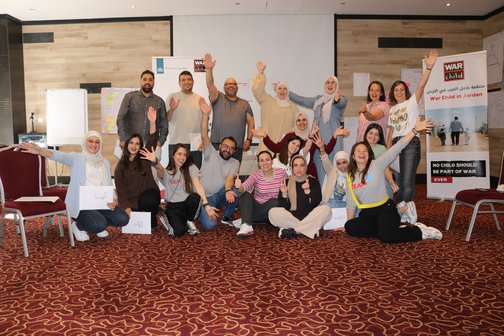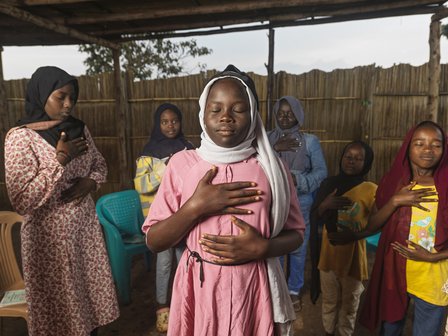War Child’s care system in practice: Integrating holistic mental health methodologies to support children in Sri Lanka
Oct. 30, 2025
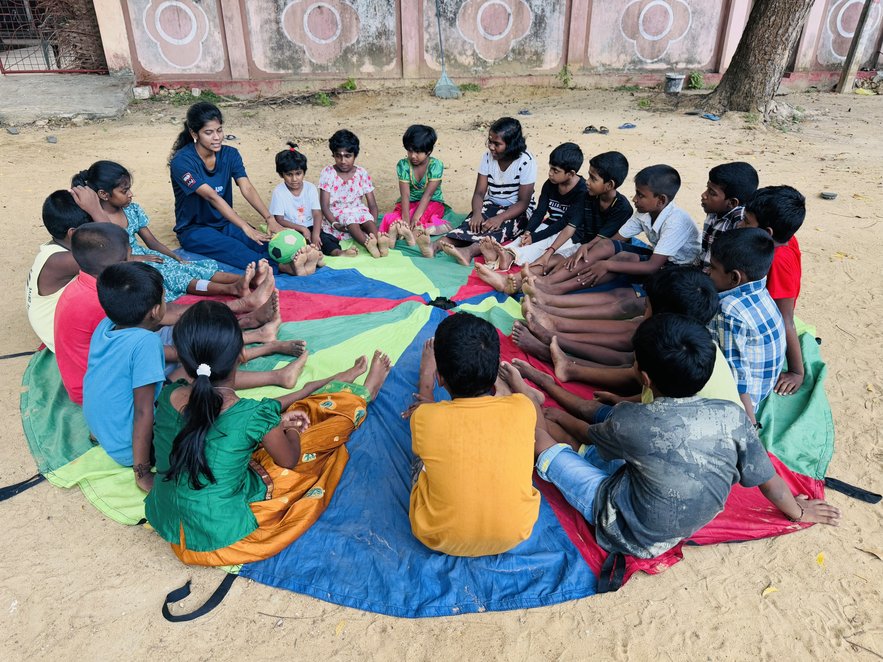
In response, War Child’s integrated care system is being put into practice through a collaboration our key partner, the Centre for Children’s Happiness (CCH).
Based in Sri Lanka, CCH is a community-rooted organisation working directly with some of the country’s most vulnerable children, including those in institutional care.
Together, we are scaling a layered, trauma-informed approach to mental health and psychosocial support—one that is culturally grounded, adaptable, and led by those who know their communities best.
The complexity of mental health needs in Sri Lanka
Sri Lanka’s mental health system is constrained by stigma, low funding, limited training, and weak coordination between institutions. In too many cases, perpetrators are protected, while survivors are silenced. Depression, anxiety, and suicidal thoughts are widely misunderstood and heavily stigmatised.
“During my stay in Sri Lanka, in a span of two weeks, there were two suicides of young teenage girls related to sexual harassment, stigma and inaccessible/ineffective child safeguarding mechanisms which made its way to the media. In both cases, these girls felt there were no other options than to suicide,” shares Katia Verreault, TeamUp Master Trainer, Mentor and Technical Advisor at War Child.
Existing services—mostly one-on-one counselling—are limited and difficult to access, particularly for children in remote or underserved areas. Disconnected efforts across hospitals, caseworkers, and community programmes further limit impact, and formal training for professionals rarely prepares them for the emotional and logistical realities on the ground. Yet, there is motivation for change. Professionals, community actors, and even government officials are increasingly open to practical, context-relevant methods that meet the real needs of children and families.
Katia is a trauma-informed expert with extensive experience in designing, refining and spreading the TeamUp sparkle around the world since its very inception. She recently travelled to Sri Lanka to support the integration of EASE and ReachNow with TeamUp, which has been implemented by our local partner CCH since 2022. Her visit marked a key milestone in putting War Child’s care system into practice—connecting evidence-based tools with community leadership and supporting local facilitators to bring holistic support to life.
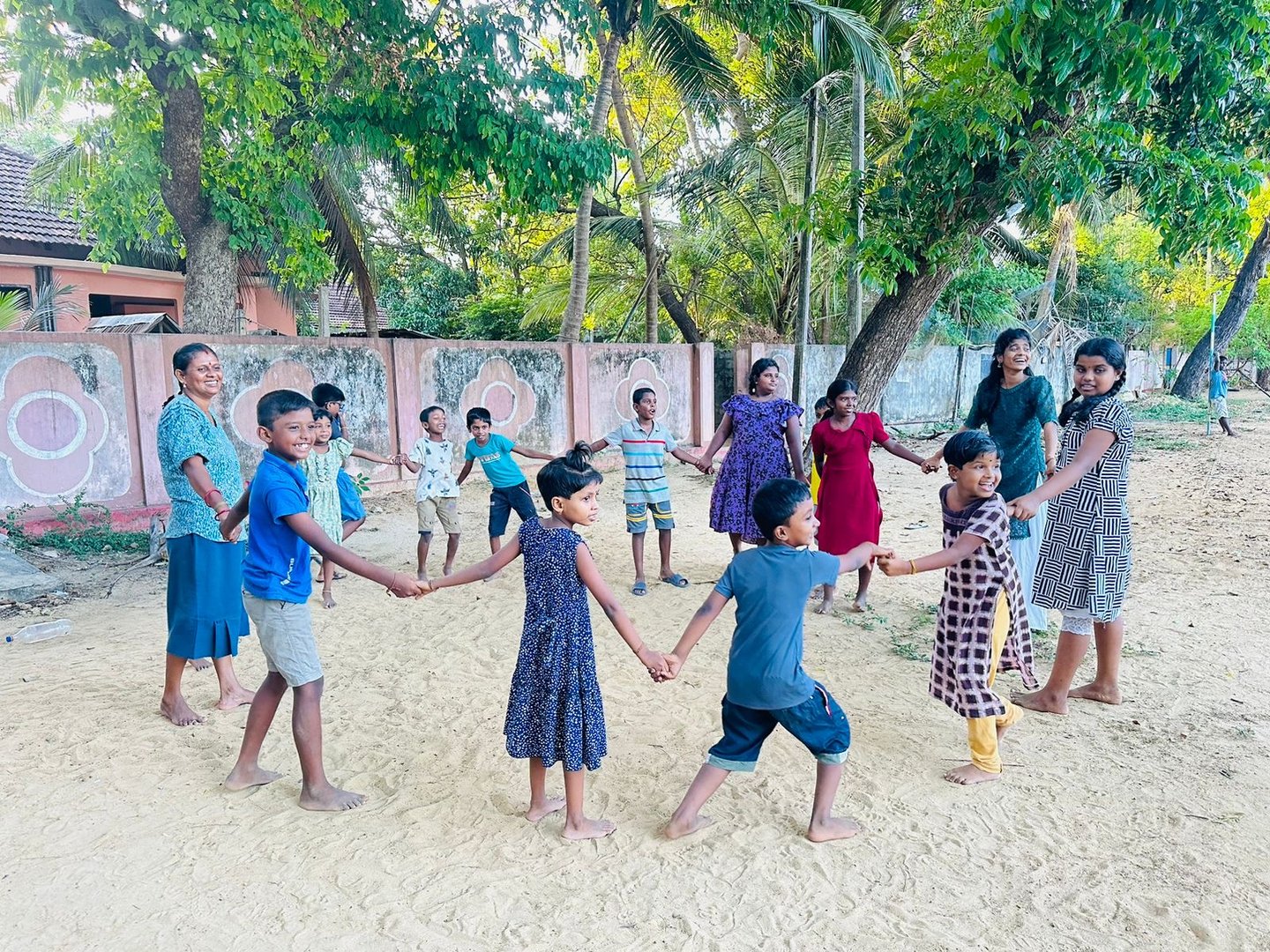
TeamUp sessions implemented by our partner, the Centre for Children's Happiness (CCH), in Sri Lanka.
Building a care package: combining strengths of multiple methodologies
War Child’s integrated care system addresses these challenges by combining multiple evidence-based methodologies into one coherent package—delivered across prevention, detection, and treatment layers. At the heart of this care system is the recognition that no single tool is enough. Instead, a set of interlocking methodologies can meet children’s needs across different environments—schools, homes, institutions, and communities.
Key components are:
- TeamUp: A movement-based psychosocial support methodology that promotes emotional well-being through non-verbal, playful activities. Developed by War Child, UNICEF and Save the Children Netherlands and rooted in trauma-informed care principles, it’s designed to be inclusive, fun, and participative. One of its mains functions is to identify children in need of further support.
- ReachNow: A simple, accessible tool to help caregivers and educators recognise early signs of mental distress and connect children to the right kind of support, such as EASE.
- EASE (Early Adolescent Skills for Emotions): A group-based methodology developed by the World Health Organisation with input from War Child, that works to alleviate symptoms of depression and anxiety in early adolescents.
Implemented together, these tools break down the silos between prevention, detection, and treatment—creating a care pathway that can adapt to children's evolving needs.
One of the most impactful examples of this integration took place in a care home for girls, facilitated by our partner CCH.
“In an institutionalised care home for girls where TeamUp was implemented, we observed youth in need of additional support with the support of the ReachNow as we conversed with the caregivers, which facilitated the identification of girls internalising behaviours such as self-harm, rumination (excessive overthinking), and social isolation, for the EASE methodology. In this specific case, the combination of TeamUp, ReachNow and EASE formed a psychosocial care package to a home where there are no social workers nor counsellors present, and the care solely rests on the shoulders of the staff caregivers,” Katia shares.
Thanks to CCH’s trusted presence and ongoing work in institutional care, War Child’s care system can reach children who might otherwise fall through the cracks. The model also builds long-term sustainability by training not just professionals, but also caregivers, teachers, and youth leaders—broadening the local mental health workforce and creating ripple effects of care. As one participant in the EASE Caregiver sessions reflected:
“EASE Caregiver sessions helped to apply in my personal life and acknowledge what to change in my life as a parent—like to spend time with children.”
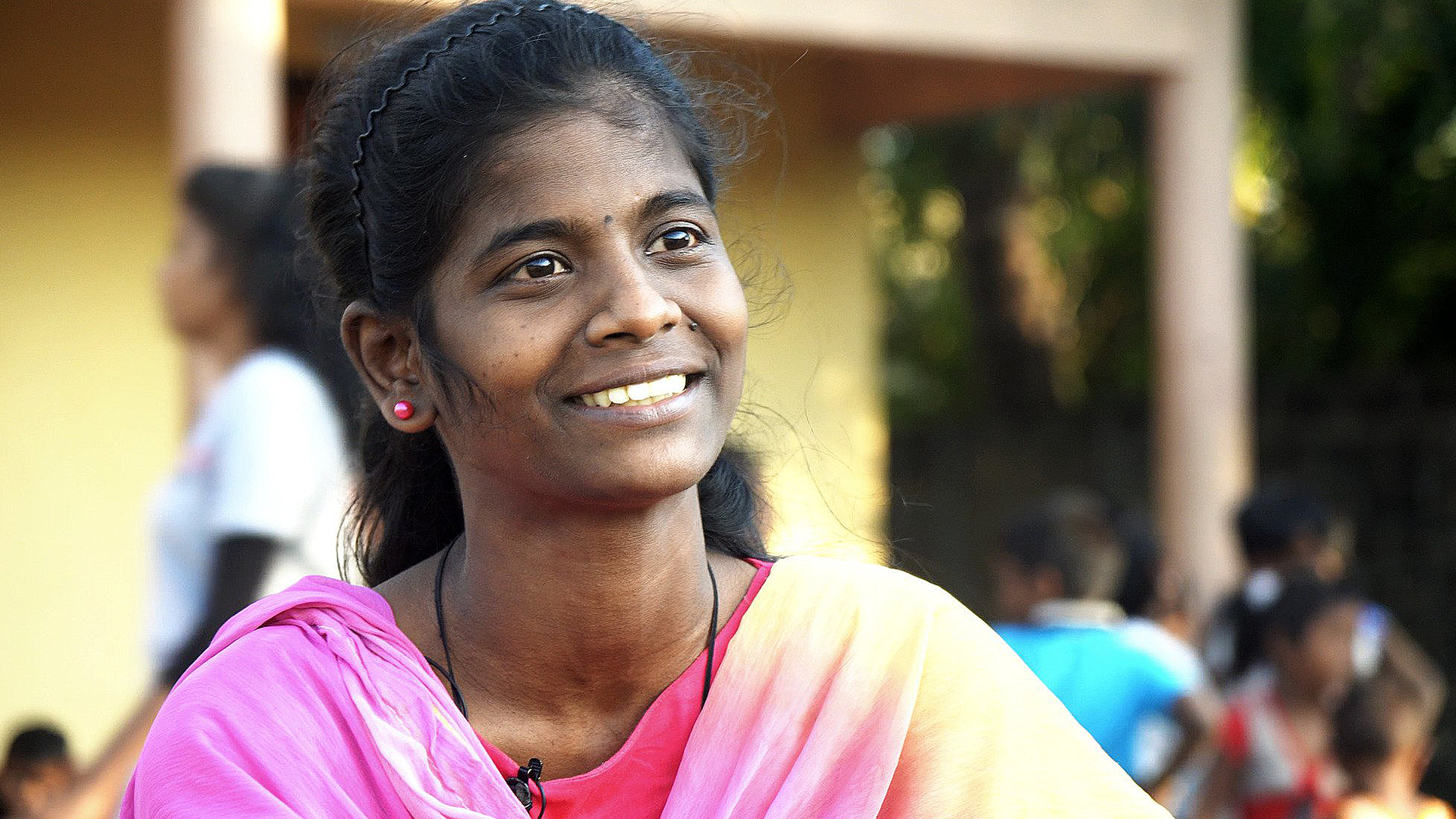
Once a TeamUp participant, Malar is now a trained TeamUp facilitator.
Malar’s journey: a living example of transformation
One of the most powerful examples from our impact in Sri Lanka is Malar's story. As a young girl from a rural area who had lost her father, Malar was carrying deep emotional pain. When she joined TeamUp, she discovered new ways to connect, regulate her emotions, and begin to heal—through movement, play, and emotional expression.
Over time, Malar transformed from a quiet, withdrawn girl into a confident young woman. “I want to study to become a lawyer”, she told us four years ago. Today, she pursuit that dream at university while also working as a trained TeamUp facilitator, bringing the same sense of safety and joy she once found to other children.
Malar’s journey didn’t happen in isolation but followed closely in the footsteps of her sister, who is also a TeamUp trainer/mentor and CCH staff member. Together, they are role models for women and youth in their community, helping to lead a growing local movement rooted in care, resilience, and hope.
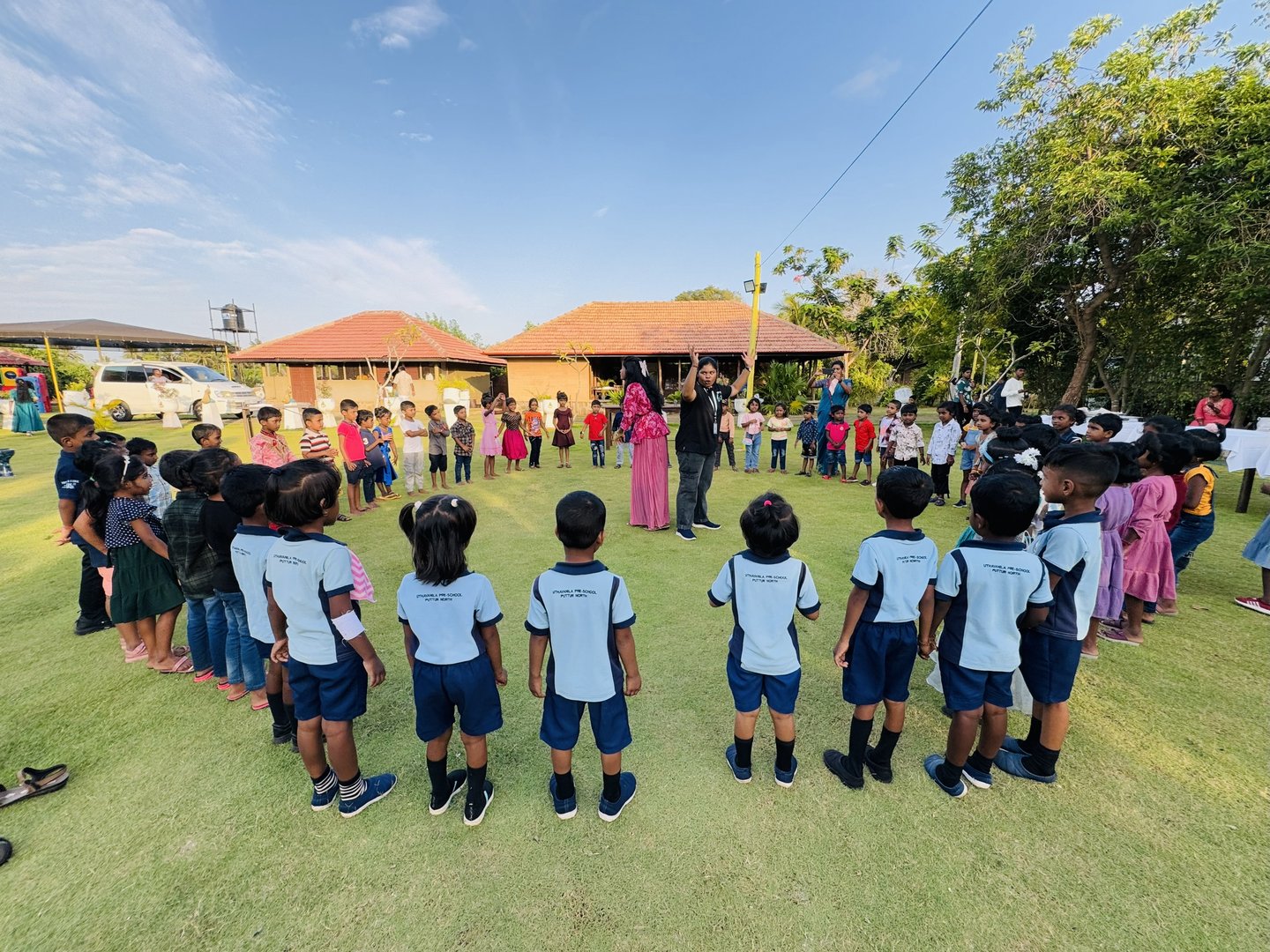
TeamUp sessions implemented by our partner, the Centre for Children's Happiness (CCH), in Sri Lanka.
The TeamUp sparkle: a unique psychosocial intervention
TeamUp stands out in the mental health landscape because of its evidence-based, scalable, and adaptable design. It works not only because of its theoretical grounding but because it is lovable, fun, and meaningful. TeamUp’s non-verbal, movement-based activities provide safe entry points that feel natural and non-threatening to children and communities, helping normalise conversations about emotions and well-being.
Katia describes the uniqueness of this methodology as: “It changes lives from the inside out! It taps into all of us—to the child in us that yearns to be seen, heard, feel connected and wants to play.”
Facilitators are trained through a fully experiential approach—no PowerPoints, no lectures, just hands-on, embodied learning. They are encouraged to “Play, Care, Do, and Model”, bringing authenticity, kindness, and joy into every session. Trainers inspire facilitators, who in turn inspire children and communities, creating a movement of change built on relationships, trust, and shared purpose.
This approach not only impacts children but also transforms the facilitators themselves, many of whom describe the learning as transformative on a personal level. The programme also fosters professional growth pathways, strengthening local capacity and ownership.
“In TeamUp, there is also possibility for professional growth; from facilitator, to trainer, mentor, master trainer, coordinator and other positions as we continue to scale. This strengthens the care package system and the quality-of-service delivery,” Katia adds.
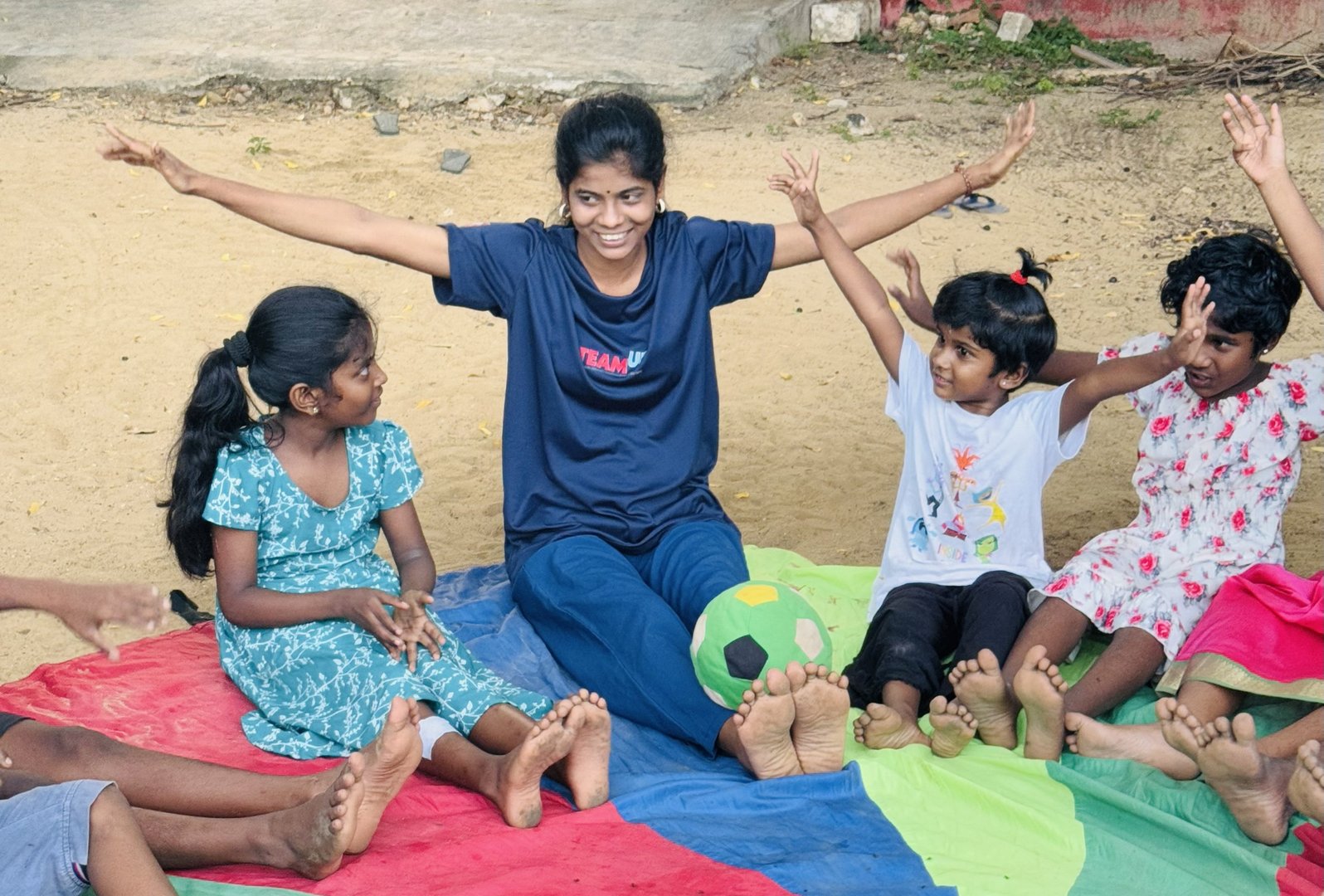
TeamUp sessions implemented by our partner, the Centre for Children's Happiness (CCH), in Sri Lanka.
Scaling with care: building a system that lasts
As TeamUp, ReachNow, and EASE continue to expand in Sri Lanka, partnerships remain essential. CCH’s role has been foundational to piloting and embedding these methodologies. Their example shows what’s possible when local organisations are not only trained but trusted to lead.
Scaling also means long-term planning, mentoring, and funding—especially in reaching marginalised groups such as children in detention, those in institutional care, or those exposed to gender-based violence.
As Katia emphasises: "A mind shift from project-based work to a more strategised step-by-step approach is needed. Furthermore, for local organisations to grow and embed the care package, they will need operational support as well as organisational capacity strengthening.”
The mental health challenges children in Sri Lanka face are significant, but so is the potential for change when evidence-based, culturally relevant, and integrated care packages are employed. Through a layered, trauma-informed care system that adapts to children’s real experiences, War Child and our partners are showing that sustainable impact is possible.
And as Malar leads her own TeamUp sessions, passing on what she once received, the circle of healing continues—child by child, facilitator by facilitator, movement by movement.
